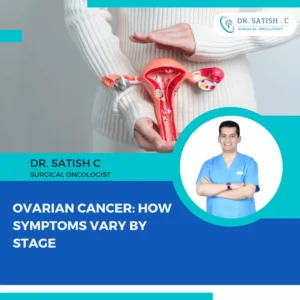Ovarian cancer is often called the “silent killer” because its symptoms can be mild and easily missed. Early detection is key to better treatment outcomes.
In this article, Dr. Satish C, a leading Surgical Oncologist, explains how ovarian cancer is diagnosed and what tests are used.
About Dr. Satish C
Dr. Satish C is a Senior Consultant – Surgical Oncology with over 18 years of experience in treating cancers of the breast, ovaries, uterus, and gastrointestinal tract. He is known for his expertise in oncological surgeries and minimally invasive cancer treatments, providing compassionate, evidence-based care to his patients.
Common Signs of Ovarian Cancer
- Persistent bloating or abdominal swelling
- Pelvic or lower abdominal pain
- Loss of appetite or feeling full quickly
- Fatigue or irregular menstrual cycles
If these symptoms last for more than a few weeks, it’s important to consult a specialist.
Tests Used to Detect Ovarian Cancer
- Pelvic Examination: To check for lumps or irregularities.
- Ultrasound (Transvaginal or Abdominal): Helps detect cysts or abnormal growths.
- CA-125 Blood Test: Measures a protein that can be elevated in ovarian cancer.
- CT/MRI Scans: Provide detailed imaging to assess the spread.
- Biopsy: Confirms the diagnosis by examining ovarian tissue under a microscope.
FAQs
1. Can ovarian cancer be found during a regular check-up?
Not usually. Specific tests like CA-125 or ultrasound are needed if symptoms persist.
2. What is the CA-125 test?
It’s a blood test that checks for elevated protein levels linked to ovarian cancer.
3. Who is at higher risk?
Women with a family history of ovarian or breast cancer have a higher risk.
4. How is ovarian cancer confirmed?
A biopsy is the most accurate test to confirm cancer cells.
5. Is early detection possible?
Yes. With the right tests and timely consultation, ovarian cancer can be detected early and treated effectively.
Conclusion
Ovarian cancer can be managed successfully when diagnosed early. For expert evaluation and comprehensive treatment, consult Dr. Satish C.




